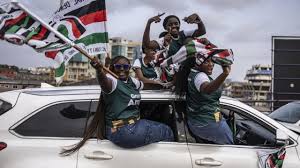Ghanaians are heading to the polls in a closely contested presidential election, with Vice President Mahamudu Bawumia of the ruling New Patriotic Party (NPP) and former President John Mahama of the opposition National Democratic Congress (NDC) as the main contenders.
The election comes as the nation grapples with a severe economic crisis, including high inflation, a depreciated cedi, and the aftermath of a debt default. These issues have dominated the campaign, with many voters expressing hope for change. “The economic situation is very hard. The cost of living is high,” said James Nsiah, a retired policeman voting in Accra.
Polling stations opened at 7:00 a.m. GMT and will close at 5:00 p.m. GMT on Saturday. Early results are expected by Sunday, with final tallies for the presidential race anticipated by Tuesday. In addition to choosing a president, voters will elect a new parliament to replace the administration of President Nana Akufo-Addo, who is stepping down after serving the maximum two terms.
To ensure a smooth voting process, Ghana’s government has temporarily closed all land borders until Sunday. The move aims to maintain the integrity of the elections, according to the interior ministry.
The NPP is campaigning under the slogan “Break the 8,” seeking an unprecedented third consecutive term. Bawumia, a UK-educated economist, has highlighted digitalization efforts, free education initiatives, and improved healthcare programs as key achievements, while countering criticism of Akufo-Addo’s economic record.
“I know what I want to do from day one in the presidency. Give me the chance to transform this nation,” Bawumia said at a final rally in Accra.
Meanwhile, Mahama is positioning himself as the candidate of change, appealing to voters dissatisfied with the current administration’s handling of the economy. With Ghana’s long history of peaceful elections and alternating power between the NPP and NDC since 1992, the results of this election are expected to be closely watched both domestically and internationally.


